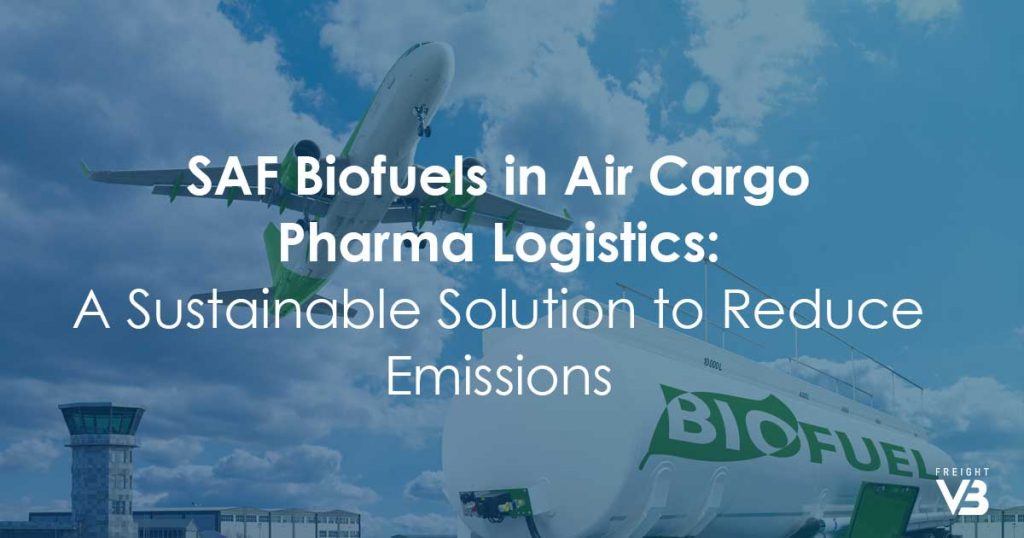
Key Takeaway Points
The Australian government’s pledge of AU$30 million to support the growth of SAF.
The potential of SAF to reduce emissions from air cargo logistics.
The expected increase in the use of SAF as the cost decreases and the supply expands.
The growing momentum behind SAF and the role that the aviation industry can play in leading the way.
The Australian government’s recent pledge of AU$30 million to support the growth of sustainable aviation fuel (SAF) is a clear sign of the growing interest in this cleaner fuel for air cargo pharma logistics. SAF has the potential to reduce emissions from air freight, and its use is expected to increase as the cost of SAF decreases and the supply expands.
The Role of Biofuels in Air Cargo Pharma Logistics: Sustainable Aviation Fuel (SAF)
Sustainable Aviation Fuel (SAF) is a biofuel made from renewable resources such as vegetable oils, animal fats, and waste products. It can be used to power aircraft without any modifications to the engines, and it has the potential to reduce greenhouse gas emissions by up to 80% compared to conventional jet fuel. Resulting in a reduced carbon footprint for air cargo pharma logistics.
SAF’s compatibility with existing aircraft engines. SAF is compatible with existing aircraft engines because it has a similar chemical composition to conventional jet fuel. SAF has been shown to improve engine performance and reduce emissions, making it a win-win for both the environment and the aviation industry.
Bio-jet Fuel
The use of biofuels for air cargo pharma logistics is gaining traction as companies look for ways to reduce greenhouse gas emissions from air travel. The use of biofuels for air cargo logistics is expected to grow in the coming years as the demand for sustainable aviation fuel increases.
Benefits of Biofuels in Air Cargo Logistics
Environmental Impact: Biofuels can reduce greenhouse gas emissions because biofuels are made from renewable resources, such as corn, soybeans, and sugarcane. Biofuels are cleaner burning fuels.
Economic and Employment Opportunities:
The SAF renewable energy sector has the potential to create millions of jobs, both directly and indirectly. For example, the production of SAF could create up to 7,500 truck drivers, 20,000 farm workers, and possibly even bigger numbers of IAP harvesters.
Challenges Associated with Biofuels in Air Cargo Pharma Logistics
Cost
Biofuels are currently more expensive than conventional jet fuel. In 2021, the cost of biofuels was approximately $5.17 per gallon, compared to $3.86 per gallon for conventional jet fuel. The International Air Transport Association (IATA) estimates that the cost of biofuels could reach parity with conventional jet fuel by 2030.
Supply Limitations
The current supply of biofuels is limited, as there is not yet a large-scale production infrastructure in place. In 2021, the global production of SAF was 120 million litres. This is expected to increase to 1.2 billion litres by 2025, and 10 billion litres by 2030.
Technical Considerations
Biofuels could have different properties than fossil fuels, which can affect engine performance. And biofuels could also contain impurities that can damage engines. New engine designs are being developed that are more compatible with biofuels. And new fuel additives are being developed to improve the performance of biofuels in engines.
Companies Embracing Biofuels for Air Cargo Logistics
Air France-KLM
Air France-KLM has been a pioneer in the use of biofuels for air cargo logistics since 2011. In 2021, the company flew its first long-haul flight powered by SAF. Air France-KLM has committed to using 10% SAF in its global fleet by 2030.
Boeing Boeing is developing biofuel-compatible aircraft engines. The company is working on a new engine that could run on a blend of 50% SAF and 50% jet fuel. Boeing is also investing in research into new biofuels that are made from sustainable sources.
Final Thoughts on SAF Biofuels in Air Cargo Phama Logistics It’s possible to blend with petroleum-based fuels, but cost is currently higher than petroleum-based fuels and supply is limited. But cost will decreas and supply will expand, and adoption of biofuels is expected to increase. Biofuels have the potential to significantly reduce emissions from air travel, making it a more sustainable option for air cargo logistics.
References
Australias government pledges AU$30M SAF growth
SAF Sustainable Aviation Fuels
Bioenergy Sustainable Aviation Fuels
Review of SAF Technical Pathways
Life-Cycle Greenhouse Gas Emissions of SAF
Air France-KLM carries out its first long-haul flight powered by SAF
How SAF Can Become Cost Competitive Against Conventional Fuel
Biofuels Production Supports Jobs
Economic Analysis of Developing a Sustainable Aviation Fuel Supply Chain


